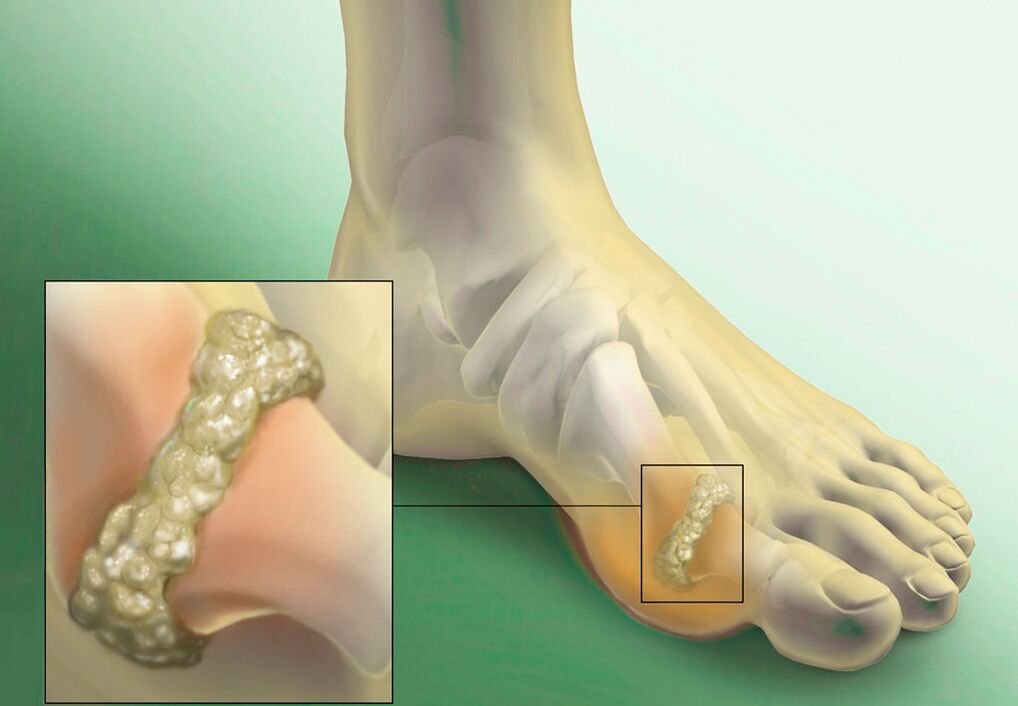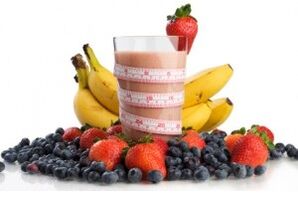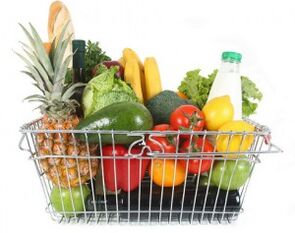The modern world is full of all kinds of food temptations. At every step we come across shops with bars, chips, buns, pies and other things, which look delicious, but will certainly sooner or later lead to stomach ailments and indigestion in general.
In ancient times, when such diseases appeared, the patient did not know about the methods of treatment and led a normal lifestyle, worsening his condition, which eventually resulted in catastrophic consequences and sometimes even fatal results.
There are now many treatment options for gastrointestinal and gastrointestinal disorders. But for their successful treatment, you need to limit yourself and completely review your usual diet.
What do we call gout?

Gout is a disease that is directly related to a disorder in the human body. With gout, uric acid salts are retained in the joint tissues, which leads to very serious consequences. Gout was first mentioned during the time Hippocrates lived, then there were many of its manifestations.
Today, the disease is thankfully less common, with about three cases per thousand people, although outbreaks of the disease have become more frequent in recent years.
Such an increase in the percentage of morbidity with this disease is associated with the food that people eat and with its volume.
Initially, an acute increase in the concentration of uric acid in a person's blood leads to disease. Derivatives of this concentration are carried throughout the body with the help of blood and deposited in joints, muscles and even organs. Such deposits are dangerous because infected tissues can be destroyed. The increase in the concentration of this acid is caused by the fact that the kidneys do not have time to process and remove from the body its excessively abundant production. Also, the problem may arise due to diseases and kidney dysfunction.
The first symptoms of the disease are joint pain, redness of the big toes and fever. It is worth mentioning a very important point that if you do not go to the doctor at the first symptoms and delay the disease, the affected joint will be completely destroyed, and this will lead to disability, and if the organ is destroyed, then constant pain and death ispossible. This is why it is necessary for the disease to be taken as seriously as possible.
The occurrence of gout depends directly on how and what a person eats and how he lives. Not without reason gout was formerly called the "disease of kings", as an inactive lifestyle, constant use of fatty, heavy foods, excessive consumption of alcoholic beverages together cause metabolic problems and consequently similar diseases. Therefore, in the treatment of gout, strict adherence to a proper diet and diet to reduce acid production is considered very important and even the main point. To detect the level of uric acid in the blood, it is enough to donate blood for tests.
How to eat properly?

Specifying the development of a diet for gout patients aims to restore uric acid metabolism in the body. If you do not take urgent measures to restore this level, then excess acids (sodium urate) are debugged throughout the body, provoking widespread inflammation.
In addition to determining the necessary diet, doctors advise to undergo medication treatment, as well as to constantly engage in physiotherapy procedures, in addition, a person with gout is advised to lead a more active lifestyle, walk and exercise in the air. Clean.
Speaking of diet, it should be noted that a necessary step would be to exclude a number of foods contraindicated from the diet. When the disease worsens, you can not eat fish and meat, it is necessary to arrange fasting days at least twice a week, and ideally every other day.
The fasting days for a patient with gout are:
- Fruits and vegetables. You should eat a pound and a half of fruit a day, which are allowed by the diet.
- Milk and kefir. In this case, the patient should drink up to two liters of this fluid per day.
- Cottage cheese and kefir. It is necessary to eat four hundred grams of cottage cheese and drink half a liter of kefir.
Such fasting days are beneficial in that they contribute to the breakdown of uric acid in the body and its removal. When the aggravation of the disease subsides, the patient can continue to eat fish and meat, but strictly steamed, boiled or roasted. It is worth remembering that you should eat these products a maximum of three times a week, and not more often.
It is necessary to adhere to the proper water regime. You should drink about three liters of clean water a day. You should drink it an hour before meals during an exacerbation of the disease. If there is no deterioration, then the water can be replaced with another liquid, the main thing is to be natural and fresh. You can also drink alkaline mineral water.
Fasting is contraindicated in gout, in which case the acid level will increase significantly, it is better to eat a little, but often.
Recommended menu for gout
With gout, you need to eat natural and healthy foods. From these products you can make a menu for every day, but you should consult your doctor about their dose, as the diet for everyone can be individual.
List of acceptable products:
- Meat products: turkey, rabbit, chicken; chicken eggs.
- Lean fish; seafood: squid, shrimp.
- Cereals: wheat grains, oatmeal, millet, rice, buckwheat.
- Macaroni; black and white bread.
- Vegetables: white cabbage, zucchini, eggplant, cucumbers, beets, potatoes, carrots.
- Onions, garlic, dill.
- Fruits: citrus, apples, pears, apricots, melons and watermelons, peaches.
- Berries: anything is possible except grapes and raspberries; dried fruits other than raisins; arra.
- Sweet: not chocolate, candy, jam, jam, marshmallow, honey.
- Natural drinks: juices, fruit drinks, fruit drinks, kvass, an hour of lemon juice, rose or bran.
- First dishes without gravy, olive oil; second courses are boiled or steamed products.

You can eat other foods, but in small quantities, such as boiled sausages, bacon, sausages. You can eat tomatoes and plums about twice a day and about twice a week.
Salt should be completely eliminated or its use should be significantly limited. It is better to cook food completely without salt and add a little salt to the dishes already prepared on the table. Of course, pickles, pickles and most spices should be removed from the diet.
It is recommended to reduce the consumption of protein foods (especially red meat), as accelerated protein metabolism provokes an increase in urate concentration. If you are overweight, you should also limit carbohydrate foods (especially baked goods, pastries).
Honey and figs, plums, grapes, some types of vegetables and root crops (turnips, celery, rhubarb, cauliflower, peppers), as well as mushrooms should be included in your diet only during forgiveness.
Otherwise, it is necessary to consult a doctor, who will prescribe a more detailed diet for a certain degree of the disease.





















